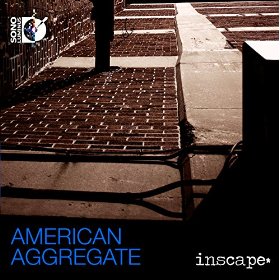 As the often misquoted William Congreve writes, “music hath charms to soothe a savage breast, to soften rock, or bend a knotted oak.” The music of the Inscape collective possesses such charms. The American heart has been bruised, hardened and knotted in recent years, but this album seeks to unknot the stress, anxiety, and fear and to knit together a different sort of tapestry: one of lush instrumental tones, reflecting the diversity of American music now and through the ages. American Aggregate is distinctly American in tone, even when the internal tones clash; the country is too large to be defined by a single collection of chords.
As the often misquoted William Congreve writes, “music hath charms to soothe a savage breast, to soften rock, or bend a knotted oak.” The music of the Inscape collective possesses such charms. The American heart has been bruised, hardened and knotted in recent years, but this album seeks to unknot the stress, anxiety, and fear and to knit together a different sort of tapestry: one of lush instrumental tones, reflecting the diversity of American music now and through the ages. American Aggregate is distinctly American in tone, even when the internal tones clash; the country is too large to be defined by a single collection of chords.
Nathan Lincoln-DeCusatis‘ three-part “Oblivion” may be the first extended chamber piece inspired by the Cloud, about which Lincoln-DeCusatis writes, (it’s) “like trying to tie down your own shadow”. He vocalizes a growing concern among musicians – that new music is struggling to make a lasting impression. When everything is digital, everything is disposable – or re-acquirable. The composer puts this concern to music via offsetting mechanical and fluid sounds, setting up a tension that is never fully resolved. In so doing, he demonstrates his ability to engage technology without being overcome by its charms. 18:50 is a long song, but three movements in that span is actually quite short – an acquiescence to modern tastes. It’s enough time to think, but not enough time for one’s mind to lose focus.
“I have never been a nature lover”, writes Armando Bayolo in his introduction to “Wide Open Spaces”. And yet, when confronted with the realities of climate change, the composer began to change his tune. Specifically, he imagined a walk in the woods leading to “barrenness” and eventually to “environmental catastrophe” – quite a walk to take in seven minutes! Would the average listener arrive at such themes without the prompting of prose? Perhaps not – the barrenness is certainly there, along with a touch of premonition. The sparse piano notes reflect the title better than the theme, as one can imagine the expanses of the American Southwest. This track leads directly to Dan Visconti‘s purposely foreboding “Black Bend”, based on a blues legend; ironically, when the actual blues emerge from the song, the shadows fade. But this is the manner of all blues: songs played in empathy, intended to bring solace and perhaps even cheer.
Julia Adolphe imagines her instruments as “Wordless Creatures” (which would make a great name for a website!). These creatures scurry around, sniff, retreat, scuffle and play; an amusing image given the thought that small ensembles tend to play in stationery seats. Here again, it’s not about the physical restraints of eye and ear, but the imagination. The same holds true for Joseph Hallman, whose piece “The Extraordinary Gryssandra Wycke” sticks out a bit on paper, designed as a “tone poem” based on a witch’s spells; but on disc, the music fits right in. Perhaps a commentary can be gleaned by metaphor: we have more in common beneath the surface than we might otherwise assume. Stephen Gorbos pays homage to “funk, progressive rock and Béla Bartók” on “What I Decided to Keep”, a track whose title spirals back around to the opening triptych; the music of Inscape is indeed worth keeping, and not only in the Cloud.
Inscape’s last album, Sprung Rhythm, was nominated for a Grammy in the category of Surround Sound. The new album seeks to match or top that honor with a superlative Blu-Ray mix. One additional track (Gregory Spears‘ “The Bear and the Dove”) is also included on the Blu-Ray. But even the CD is clear and resonant. It would be a shame for the Grammies to stop there; we’re pulling for an award in the Best Chamber or Best Contemporary Classical category this year. (Richard Allen)
